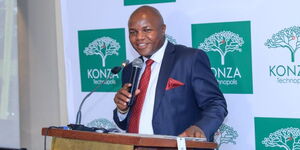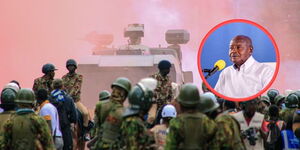If you are observant on the road, you will have noticed traffic police mounting checkpoints on various roads, often stopping matatus for barely a second. This ritual, which sees a conductor give the police officers some money, ranging from Ksh50 to Ksh200 in some areas, is often to avoid a push and pull between police and public service vehicles.
However, the practice is running out of control and has now turned into a full-fledged extortion ring, according to the Motorists Association of Kenya. The lobby group, in a scathing statement, condemned what it termed as rampant extortion, abuse of power, and intimidation tactics being perpetrated by rogue officers within the National Police Service under the guise of traffic enforcement.
In a statement released on Monday, the association expressed outrage over the transformation of traffic policing from a public safety service to a predatory enterprise that harasses and extorts ordinary Kenyans. They accused some officers of operating like an extortion cartel, exploiting motorists rather than protecting them.
“The stories are horrifying. False speed limits are being planted to trap innocent drivers. Matatu operators are being asked to pay ‘protection fees’ or face arbitrary arrests. Officers are lurking on feeder roads like hunters waiting for prey—not to serve, but to pounce,” the statement read.
The association further alleged that senior police officers have abandoned official service vehicles and now chase down motorists using high-end personal cars, allegedly fuelled by proceeds from bribes and illegal spot fines.
They cited the recent death of Narok Traffic Base Commander Kipchumba Rotich, who fatally crashed a high-end Toyota Prado during a high-speed pursuit over the weekend, as a reflection of how distorted the traffic enforcement mission has become.
“Since when did policing traffic become a Hollywood-style pursuit?” the statement questioned. “What was meant to be a service to protect life and uphold order on our roads has degenerated into a lawless and dangerous racket.”
Demands to the Govt
The group is now calling on the government to urgently intervene, audit the conduct of the traffic police department, and institute sweeping reforms to restore public confidence and ensure that enforcement is driven by safety, not profit. They warned that if no action is taken, motorists may be forced to explore legal avenues to protect their rights and dignity on the roads.
Further, in its demands, the lobby called for an immediate end to all unofficial traffic operations involving the use of unmarked, unregistered, or privately owned vehicles.
The association warned that the continued use of such vehicles only fuels intimidation and abuse, making it hard for motorists to distinguish between legitimate law enforcers and impersonators.
The association is also calling for a comprehensive audit of all traffic police operations, particularly the collection and handling of cash bail and fines. According to the group, transparency is long overdue and could help uncover long-standing corruption and misuse of funds by officers on the ground.
Additionally, they proposed the formation of a special task force led by civilian oversight bodies and independent prosecutors to investigate what they termed as “extortion cartels” operating within the police service. The task force, they say, should operate free of police interference and with full legal authority.
The motorists’ lobby further demanded full protection for whistleblowers within the force willing to expose corrupt practices, warning that without safeguarding internal accountability, reform efforts would be futile.












